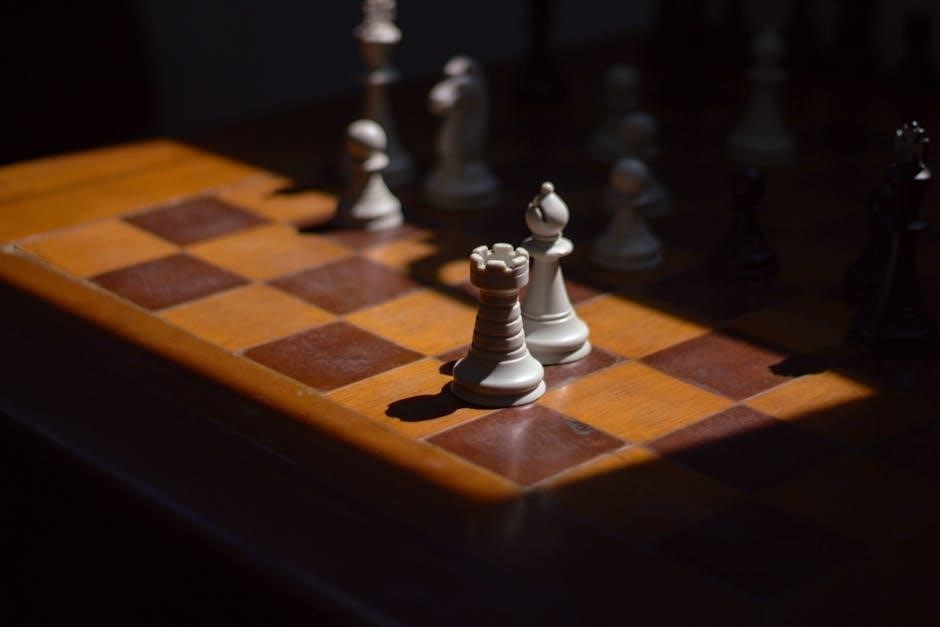
PDF chess puzzles are digital resources offering tactical exercises and strategic challenges. They provide convenient, portable, and accessible tools for players of all skill levels to improve their game.
What Are PDF Chess Puzzles?
PDF chess puzzles are digital collections of tactical exercises and strategic challenges designed to enhance chess skills. They often include checkmates, forks, pins, and endgame strategies, sourced from real games. These puzzles cater to all skill levels, providing a versatile and accessible way to practice and improve. They are widely available as downloadable resources for personal use, making them a popular tool for chess enthusiasts.
Why Use PDF Chess Puzzles for Training?
PDF chess puzzles are ideal for training due to their versatility and convenience. They offer a structured way to practice tactics, checkmates, and endgames, essential for skill improvement. Players can access puzzles anywhere, making them perfect for consistent practice. Additionally, PDFs are cost-effective and cater to all skill levels, providing a practical tool for enhancing chess performance and reinforcing key concepts through regular solving.

Benefits of Using PDF Chess Puzzles
PDF chess puzzles offer convenience, portability, and accessibility for all skill levels, making them a cost-effective tool for improving tactical skills and strategic thinking in chess.
Convenience and Portability
PDF chess puzzles offer unmatched convenience and portability, allowing players to access puzzles anytime, anywhere. They can be easily downloaded, stored on devices, and printed, making them ideal for practice on-the-go. Whether commuting, traveling, or relaxing at home, PDFs provide a flexible way to enhance chess skills without needing physical books or internet connectivity.
Accessibility for All Skill Levels
PDF chess puzzles cater to players of all skill levels, from beginners to advanced. They include a variety of exercises, such as mate in one, endgames, and tactical combinations, ensuring challenges for everyone. Many resources offer puzzles graded by difficulty, allowing players to progress at their own pace. This accessibility makes PDFs an ideal tool for continuous improvement, regardless of one’s current chess proficiency.
Cost-Effective Learning Tool
PDF chess puzzles are an economical way to enhance your skills. Many high-quality resources are available for free or at a low cost, offering thousands of puzzles. Unlike traditional books, PDFs can be easily downloaded and accessed without additional expenses, making them a budget-friendly option for players seeking to improve their chess abilities without financial strain.
How to Download and Use PDF Chess Puzzles
Access PDF chess puzzles through reputable websites or forums. Download them easily using direct links or torrent files. Once downloaded, open with PDF readers like Adobe Acrobat or print them for offline practice, ensuring convenient access to tactical training anytime, anywhere, without internet dependency;
Popular Sources for PDF Chess Puzzles
Reputable websites like chess.com, lichess.org, and chess24.com offer a wide range of free and premium PDF chess puzzles. Additionally, platforms such as qualitychess.co.uk and chessfield.ru provide high-quality downloadable content. Community-driven forums like Reddit’s r/chess and specialized chess forums often share user-generated puzzles. These sources cater to all skill levels, ensuring access to diverse and challenging content for improvement.
How to Print and Solve PDF Puzzles
To print PDF puzzles, open the file in a PDF reader, select the print option, and choose a standard printer setup. For solving, start by reviewing the puzzle notation, then analyze the board position. Use a chessboard or digital tool for visualization. Take your time to identify tactical motifs or checkmate patterns. Reviewing mistakes and learning from them is key to improvement. This method enhances problem-solving skills effectively.
Tools for Converting Chess Content to PDF
Several tools enable chess content conversion to PDF. Online converters like Smallpdf or ILovePDF allow direct uploads of chess puzzle files. Chess software such as ChessBase or Fritz can export games and puzzles as PDFs. Additionally, Microsoft Word or LibreOffice can be used to format and save chess diagrams and text as PDFs. These tools ensure high-quality output for easy sharing and printing of chess materials.
Creating Custom PDF Chess Puzzles
Custom PDF chess puzzles allow personalized learning. Use generators to create tailored puzzles, organize them by difficulty, and utilize software tools for professional-grade design and output.
Using Chess Puzzle Generators
Chess puzzle generators simplify creating custom puzzles. They offer exercises based on skill levels and specific tactics, such as checkmates, forks, and pins. Users can generate puzzles from practical games or theoretical positions, ensuring variety and relevance. These tools often allow organization by difficulty and type, making it easy to track progress. Many generators export puzzles directly to PDF, providing a convenient format for printing or digital use, enhancing the learning experience for chess enthusiasts of all levels.
Organizing Puzzles by Difficulty and Type
Organizing chess puzzles by difficulty and type enhances learning efficiency. Categorizing puzzles into sections like “Beginner,” “Intermediate,” and “Advanced” helps players focus on appropriate challenges. Grouping by tactical themes, such as checkmates, forks, or endgames, allows targeted skill improvement. This structured approach ensures that each puzzle aligns with the player’s current level and goals, making practice sessions more productive and enjoyable, while also aiding in tracking progress over time effectively.
Software Tools for Making Chess Puzzles
Software tools like ChessBase, Puzzle Generator, and ChessTempo offer robust features for creating custom chess puzzles. These programs allow users to design puzzles with specific themes, difficulty levels, and positions. They also provide options for organizing puzzles into collections and exporting them as PDFs. Such tools are ideal for coaches, content creators, and players seeking tailored practice material, enabling efficient and personalized skill development through interactive and structured exercises.

Top Recommended PDF Chess Puzzle Books
Discover top PDF chess puzzle books like “365 Chess Puzzles,” “Laszlo Polgar’s Book on Checkmate,” and “Intermediate Chess Puzzles,” offering diverse tactical exercises for all skill levels.
365 Chess Puzzles

365 Chess Puzzles offers 365 tactical exercises from 2012 events like Wijk aan Zee. It covers various tactical ideas, suitable for all levels, enhancing your chess skills with practical problems.
Laszlo Polgar’s Book on Checkmate
Laszlo Polgar’s book is a comprehensive guide to checkmate, featuring over 5,000 examples. It focuses on mating attacks and forced endgame wins, providing deep insights into tactical strategies. Designed for players of all levels, it offers a rich collection of practical puzzles to enhance checkmate skills and improve overall gameplay.
Intermediate Chess Puzzles
Intermediate Chess Puzzles offer a challenging yet manageable way to refine your strategies. Designed for players seeking to advance beyond basics, these puzzles cover a wide range of tactical ideas, collected from practical games. Organized by difficulty, they help improve critical thinking and problem-solving skills, making them an excellent tool for enhancing gameplay and preparing for competitive chess.
Quality Chess Puzzle Book
The Quality Chess Puzzle Book is a curated collection of challenging puzzles designed to sharpen tactical and strategic skills. With contributions from experienced players, it offers diverse exercises, from simple motifs to complex combinations. This book caters to intermediate and advanced players, providing a comprehensive tool for improving gameplay and deepening understanding of chess principles through practical problem-solving.
Advanced Techniques in PDF Chess Puzzles
Advanced PDF chess puzzles focus on complex tactics like mate in one, two, or three moves, and sophisticated endgame strategies. These exercises refine expertise and deepen mastery.
Mate in One, Two, and Three Moves
Mate in one, two, or three moves challenges players to find checkmate quickly. These puzzles involve precise tactical patterns like forks, pins, and skewers. Solving them sharpens recognition of tactical motifs and improves endgame execution. Advanced players can refine their skills with complex combinations, while beginners learn fundamental checkmate techniques. Regular practice enhances problem-solving speed and accuracy, making these puzzles essential for skill development at all levels.
Endgame Strategies
Endgame strategies in PDF chess puzzles focus on techniques to convert advantages into victories. Players learn king and pawn positions, rook endgames, and bishop maneuvers. These puzzles emphasize precise calculation and positional understanding. Regular practice helps recognize common patterns, improve decision-making, and master fundamental endgame principles. Solving endgame puzzles enhances players’ ability to handle the final stages of a game confidently and efficiently, boosting their overall chess performance.
Tactical Combinations
Tactical combinations in PDF chess puzzles focus on recognizing patterns like forks, pins, skewers, and checkmates. These exercises enhance problem-solving skills and improve a player’s ability to execute precise sequences. Sourced from real games, they cover a wide range of scenarios, helping players develop intuition and calculated decision-making. Regular practice strengthens tactical awareness, enabling players to spot and exploit weaknesses effectively during actual games, boosting overall chess performance.

Improving Your Chess Skills with PDF Puzzles
PDF chess puzzles enhance problem-solving abilities, sharpen tactical awareness, and refine strategic thinking. Regular practice improves decision-making and pattern recognition, elevating overall chess proficiency for players of all levels.
Practical Tips for Solving Puzzles
Start by analyzing the position thoroughly, identifying key pieces and potential threats. Break down complex problems into smaller, manageable parts. Practice regularly, focusing on one tactic at a time, such as pins or forks. Use visual aids to track piece movements and plan ahead. Review mistakes to understand overlooked patterns. Experiment with different strategies to refine your problem-solving skills. Consistent practice with PDF puzzles sharpens your chess intuition and enhances gameplay.
Time Management and Puzzle Solving
Effective time management is crucial for maximizing puzzle-solving efficiency. Allocate a set time per puzzle to simulate real-game conditions. Prioritize understanding the position over rushing for quick solutions. Use timers to track progress and gradually reduce time as skills improve. Regular practice with timed exercises enhances decision-making under pressure, translating to better performance in actual games. This approach ensures steady improvement in both speed and accuracy.
Tracking Progress and Improvement
Monitoring your progress is essential to gauge improvement. Maintain a log to record solved puzzles, noting difficulties and mistakes. Regularly review past attempts to identify recurring errors. Use performance metrics like accuracy rates and solution times to measure growth. Celebrate milestones and adjust your study plan based on weaknesses. This systematic approach ensures continuous development and helps refine your chess skills effectively over time.
Common Mistakes to Avoid
Common mistakes include rushing through puzzles, neglecting basic tactics, and failing to analyze errors. These oversights hinder progress and mastery of chess strategies effectively.
Rushing Through Puzzles
Rushing through puzzles is a common mistake that prevents players from fully understanding the strategies and patterns. It often leads to missed opportunities to improve critical thinking and problem-solving skills. By rushing, players may overlook key tactical details and fail to grasp the underlying concepts necessary for long-term progress. Taking the time to analyze each puzzle thoroughly ensures a more effective learning experience and better retention of chess principles.
Not Analyzing Mistakes
Not analyzing mistakes is a significant oversight in chess puzzle practice. Failing to review errors prevents players from understanding where they went wrong and how to avoid similar blunders in the future. This lack of reflection hinders progress, as key tactical motifs and strategic insights are often missed. Regularly reviewing mistakes is crucial for improving problem-solving skills and refining decision-making during games.
Overlooking Basic Tactics
Overlooking basic tactics is a common mistake that can hinder progress in solving PDF chess puzzles. Neglecting fundamental concepts like pins, forks, and skewers often leads to missed opportunities and incorrect solutions. Even experienced players can fall into this trap if they skip reviewing foundational principles. Regular practice and a focus on these basics are essential to mastering tactical exercises and improving overall chess proficiency effectively.

Chess Puzzle Tournaments and Competitions
Chess puzzle tournaments and competitions are popular among players, offering a competitive outlet to test skills and strategies. Online platforms and local events provide structured challenges for all skill levels, fostering growth and enjoyment.
Online Platforms for Puzzle Competitions
Online platforms like Lichess and Chess.com host puzzle competitions, offering timed challenges and leaderboards. These platforms provide access to thousands of puzzles, categorized by difficulty and type. Players can compete globally, track progress, and learn from others. Such platforms are ideal for sharpening skills in a competitive environment, making them invaluable for chess enthusiasts seeking improvement and fun.
Participating in Local Chess Puzzle Events
Local chess clubs and community centers often organize puzzle-solving events, fostering camaraderie and competition. These events feature printed or digital puzzles, allowing players to test their skills in person. Participants benefit from direct feedback and tips from experienced players, enhancing their problem-solving abilities and strategic thinking in a supportive environment.
Benefits of Competitive Puzzle Solving
Competitive puzzle solving enhances problem-solving speed, analytical thinking, and strategic planning. Players gain exposure to diverse tactical ideas and motifs, improving their ability to handle complex positions. These events also foster a sense of community and healthy competition, motivating players to refine their skills and track progress over time.

Chess Puzzle Communities and Forums
Online communities and forums connect enthusiasts, offering spaces to share puzzles, discuss strategies, and learn from experienced players, fostering collaboration and growth in chess skills.
Popular Online Communities for Chess Puzzle Enthusiasts
Online platforms like Reddit’s r/chess, Chess.com, and Lichess host vibrant communities where players share and solve puzzles; These forums offer resources, discussions, and expert insights, fostering growth and collaboration among enthusiasts. They provide spaces to exchange ideas, learn from experienced players, and access a wide range of PDF materials, making them invaluable for improving chess skills and staying connected with fellow puzzle solvers.
Sharing and Discovering New Puzzles
Online communities and forums enable players to share and discover new chess puzzles. Platforms like Reddit’s r/chess and specialized websites offer downloadable PDFs, such as “365 Chess Puzzles” and Laszlo Polgar’s works. Users can upload their own creations, fostering collaboration and access to diverse tactical challenges. This sharing culture promotes continuous learning and engagement among enthusiasts, making it easier to find and enjoy high-quality chess puzzles tailored to various skill levels and interests.
Learning from Experienced Players
Experienced players often share their insights through PDF chess puzzles, offering valuable lessons. Books like Laszlo Polgar’s works and John Shaw’s collections provide expert-level challenges. Online forums and communities allow players to learn from others, discuss strategies, and gain tips. These resources help improve tactics and endgame techniques, making it easier for players of all levels to refine their skills and adopt winning strategies from seasoned experts.
PDF chess puzzles offer a convenient and effective way to improve your game. Regular practice with these resources can enhance your skills and strategic thinking significantly.
Final Thoughts on PDF Chess Puzzles
PDF chess puzzles are invaluable tools for players seeking to enhance their skills. They offer a wide range of tactical exercises, from simple checkmates to complex endgame strategies. These resources are convenient, cost-effective, and accessible to players of all levels. Regular practice with PDF puzzles can significantly improve your strategic thinking and overall gameplay. They also foster a sense of community, as players share and solve puzzles together, making them a timeless asset for chess enthusiasts worldwide.
Encouragement to Keep Practicing
Consistency is key to improving with PDF chess puzzles. Regular practice, even for short periods, helps build intuition and reflexes. Celebrate small victories and learn from mistakes. The journey to mastery is lifelong, and each puzzle solved brings you closer to your goals. Stay motivated, enjoy the process, and embrace the challenges that PDF chess puzzles offer to elevate your game and deepen your passion for chess.
 the good and beautiful bible study pdf
the good and beautiful bible study pdf  memorial day word search pdf
memorial day word search pdf  recovering from emotionally immature parents pdf
recovering from emotionally immature parents pdf  humayun ahmed pdf
humayun ahmed pdf  c.s. lewis mere christianity pdf
c.s. lewis mere christianity pdf  pathfinder character sheet pdf fillable
pathfinder character sheet pdf fillable  magic bullet user manual
magic bullet user manual  kctv guide
kctv guide  sample shipper’s letter of instruction
sample shipper’s letter of instruction